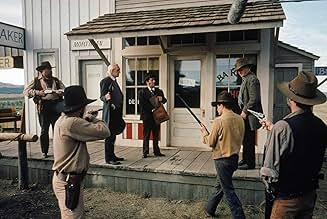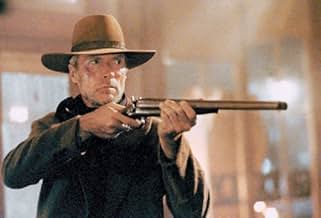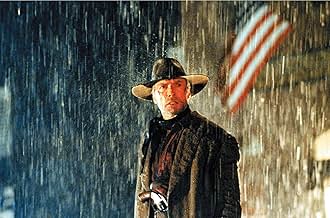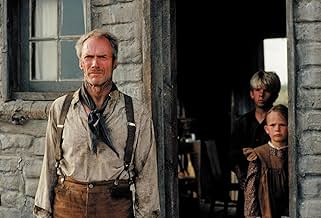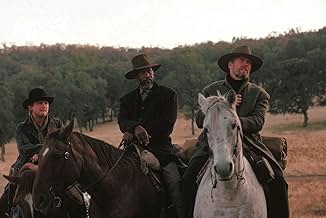El pistolero del viejo oeste William Munny acepta a regañadientes un último trabajo con ayuda de su viejo compañero y de un joven.El pistolero del viejo oeste William Munny acepta a regañadientes un último trabajo con ayuda de su viejo compañero y de un joven.El pistolero del viejo oeste William Munny acepta a regañadientes un último trabajo con ayuda de su viejo compañero y de un joven.
- Ganó 4 premios Óscar
- 52 premios ganados y 47 nominaciones en total
Tara Frederick
- Little Sue
- (as Tara Dawn Frederick)
Shane Thomas Meier
- Will Munny
- (as Shane Meier)
- Dirección
- Guionista
- Todo el elenco y el equipo
- Producción, taquilla y más en IMDbPro
Resumen
Reviewers say 'Unforgiven' is celebrated for its intricate themes of morality, violence, and redemption, redefining Western genre conventions. Clint Eastwood's direction and performance receive high praise, as do Morgan Freeman and Gene Hackman's supporting roles. The film's examination of violence's human toll and moral ambiguity is noted. Some find it slow and emotionally distant, while others hail it as a masterpiece.
Opiniones destacadas
William Munny (Clint Eastwood taking the lead and directing the piece) is an old and retired gunman whose past misdemeanours would make the devil himself seem tame. Widowed and struggling to raise his two children on a paltry farm, he's tempted out of retirement for one last pay dirt job, the consequence of which provides violence - both physically and of the soul.
Clint Eastwood signed off from the Western genre with this magnificent 1992 picture, the appropriation and irony of which is in itself a majestic point of reference. After the script had been knocking around for nigh on twenty years (written by Blade Runner scribe David Webb Peoples), Eastwood seized the opportunity to play William Munney and lay bare the mythologies of the Wild West.
It's striking that the makers here have lured us in to being firmly on Munney's side, we are, incredibly, influenced by Eastwood's part in the history of the Western. In spite of Munney's obvious murky past (despicable crimes they be), we wait (and hope) for Munney to make a quip and way lay the bad guys - in fact salivating at the prospect is probably closer to the truth. So it's with enormous credit that Eastwood, and his magnificent cast and crew, manage to fuddle all our respective perceptions of the West and the characters we ourselves have aged with.
It's not for nothing that W.W. Beauchamp (Saul Rubinek) is one of the critical characters on show, this even though we didn't expect that to be the case. Beauchamp is a writer of penny pulpy novels that tell of derring-do heroics, gunslingers with a glint in their eye who deal death as some sort of heroic encore. This gives Unforgiven an excellent sleight of hand, for this West is grim and a destroyer of all illusions and it's not controversial to say that this is indeed a good thing.
Eastwood is greatly served by the actors around him, Morgan Freeman, Gene Hackman (winning the Best Supporting Actor Oscar for a script he turned down many years before!), Rubinek, Frances Fisher, Anna Thomson, Jaimz Woolvett and an incredible cameo from Richard Harris. Along with Hackman's win for his brutally tough portrayal of Sheriff "Little Bill" Daggett, Unforgiven also won Oscars for Eastwood for his clinically tight direction, Best Picture, Best Editing and it was nominated in another five categories. One of those nominations was for Jack Green's cinematography, which now, in this age of High Definition enhanced cinema, can be seen in all its wonderful glory. The Alberta location is magically transformed into the Western frontier, with the orange and brown hues a real treat for the eyes.
Ultimately though, Unforgiven is a lesson in adroit film making, where across the board it works so well. Why? Well because the man at the helm knows this genre inside out, he was after all the sole flag bearer for practically 25 years. He learnt from his peers, and thus Eastwood has crafted a thematically complex piece that for all its violence, debunking and melancholy pulse beats, is a film that is as beautiful as it is most assuredly stark. An incredible and true highlight of modern day cinema, regardless of being a genre fan or not. 10/10
Clint Eastwood signed off from the Western genre with this magnificent 1992 picture, the appropriation and irony of which is in itself a majestic point of reference. After the script had been knocking around for nigh on twenty years (written by Blade Runner scribe David Webb Peoples), Eastwood seized the opportunity to play William Munney and lay bare the mythologies of the Wild West.
It's striking that the makers here have lured us in to being firmly on Munney's side, we are, incredibly, influenced by Eastwood's part in the history of the Western. In spite of Munney's obvious murky past (despicable crimes they be), we wait (and hope) for Munney to make a quip and way lay the bad guys - in fact salivating at the prospect is probably closer to the truth. So it's with enormous credit that Eastwood, and his magnificent cast and crew, manage to fuddle all our respective perceptions of the West and the characters we ourselves have aged with.
It's not for nothing that W.W. Beauchamp (Saul Rubinek) is one of the critical characters on show, this even though we didn't expect that to be the case. Beauchamp is a writer of penny pulpy novels that tell of derring-do heroics, gunslingers with a glint in their eye who deal death as some sort of heroic encore. This gives Unforgiven an excellent sleight of hand, for this West is grim and a destroyer of all illusions and it's not controversial to say that this is indeed a good thing.
Eastwood is greatly served by the actors around him, Morgan Freeman, Gene Hackman (winning the Best Supporting Actor Oscar for a script he turned down many years before!), Rubinek, Frances Fisher, Anna Thomson, Jaimz Woolvett and an incredible cameo from Richard Harris. Along with Hackman's win for his brutally tough portrayal of Sheriff "Little Bill" Daggett, Unforgiven also won Oscars for Eastwood for his clinically tight direction, Best Picture, Best Editing and it was nominated in another five categories. One of those nominations was for Jack Green's cinematography, which now, in this age of High Definition enhanced cinema, can be seen in all its wonderful glory. The Alberta location is magically transformed into the Western frontier, with the orange and brown hues a real treat for the eyes.
Ultimately though, Unforgiven is a lesson in adroit film making, where across the board it works so well. Why? Well because the man at the helm knows this genre inside out, he was after all the sole flag bearer for practically 25 years. He learnt from his peers, and thus Eastwood has crafted a thematically complex piece that for all its violence, debunking and melancholy pulse beats, is a film that is as beautiful as it is most assuredly stark. An incredible and true highlight of modern day cinema, regardless of being a genre fan or not. 10/10
In 1992, Clint Eastwood created the last and greatest western; 'Unforgiven'. A tribute to the previous masters, Sergio Leone and Don Siegel, who died within a mere 3 years before this brutal masterpiece.
Eastwood stars as William Munny a retired gunslinger with a guilt-filled past. He lives alone with his two children and grave of his young wife outside. One day a young cowboy, The Schofield Kid (Jaimz Woolvett), comes in need of his service to hunt down some men who cut up a whore. William reluctantly accepts and with the help of Ned Logan (Morgan Freeman) they work together to track down the criminals. Meanwhile, the sheriff of the town, Little Bill Daggett (Gene Hackman) is also looking for them. This then leads to a bloody showdown climax, welcoming back a sort of 'Man With No Name' character to the genre.
William Munny is a cold-blooded killer. The Schofield Kid wants to be one. But, all the murders and sins Munny used to commit has affected him in an extraordinary way. He takes no hesitation in killing. In the climax he just walks past a man he shot who didn't die and shoots him dead. It may sound like nothing now, but he just took a life for no apparent reason. When the Kid kills his first man, of which deserved it, he hesitates. This is The Kid who is so eager to kill people as he thinks it will make him a man. But after the assassination, he breaks down. He realized what he had done. He had wiped another man of the earth. And Munny does it with ease. So does Little Bill. He is a violent and brutal cop who uses torture to get what he wants from the prisoners. Logan also finds it hard to take lives.
The film studies on how much a life is worth. Sometimes it is worthless (see Tarantino or Scorsese films) and sometimes it is a major feature. Usually a film only does one. Unforgiven does both. A life isn't worth the same amount to each person. When a life is taken, it is the killer who decides how much it is worth by how much it affects him. Whether he just lets it slide (Munny and Little Bill) or kills someone and calls it a day (Kid and Logan), because they can't bring themselves to forgetting it. This is the most thought-provoking thing for me personally, ever.
Unforgiven in my opinion is the greatest western. Actually, its the greatest film of all-time. It shows how violent it was back then, and the fact everybody was beaten. It is more realistic than any of Leone's 'Man With No Name' films (though I will admit they were set in a sort of fantasy land). But, Munny is not proud of his violent nature. He blames it on alcohol; which his wife persuaded him to quit to explain why he also gave up being a murderer. The film shows the cowboys as they really are, either cowards or killers. The choice of word 'coward' is to say that they should be killers, as that is apparently what a man is (an exaggeration) as most westerns glorify violence, but the men can't handle it.
Clint Eastwood did an amazing job as William Munny. He showed how he regretted his past very well by admitting to it in a shameful way; like when asked if he killed women and children he replied "I've killed just about anything that walked or crawled at one time or another, and I'm here to kill you ". He even admits that he will meet Little Bill in Hell. Gene Hackman delivers one of the greatest performances of the decade, the tension he makes is incredible. Woolvett and Freeman remain in solid above average performances throughout.
The script, written by David Webb Peoples, buzzed around Hollywood for nearly 20 years, even being rejected by some of the cast, before Eastwood picked it up. Clint Eastwood deserved his Oscar for best direction. The plot flowed fluently with some surprises and memorable lines. An instant classic. The cinematography is much different that of 'The Good, The Bad and The Ugly' or the others westerns Eastwood appeared in. It is a much cleaner and crisp view, yet also being extremely raw. The score, though not used often is very refreshing and moving.
'Unforgiven' is an unforgettable look on life, man and the real west. One of the most powerful films of the '90s. A true triumph exploring important morals. Do not miss it.
9/10
Eastwood stars as William Munny a retired gunslinger with a guilt-filled past. He lives alone with his two children and grave of his young wife outside. One day a young cowboy, The Schofield Kid (Jaimz Woolvett), comes in need of his service to hunt down some men who cut up a whore. William reluctantly accepts and with the help of Ned Logan (Morgan Freeman) they work together to track down the criminals. Meanwhile, the sheriff of the town, Little Bill Daggett (Gene Hackman) is also looking for them. This then leads to a bloody showdown climax, welcoming back a sort of 'Man With No Name' character to the genre.
William Munny is a cold-blooded killer. The Schofield Kid wants to be one. But, all the murders and sins Munny used to commit has affected him in an extraordinary way. He takes no hesitation in killing. In the climax he just walks past a man he shot who didn't die and shoots him dead. It may sound like nothing now, but he just took a life for no apparent reason. When the Kid kills his first man, of which deserved it, he hesitates. This is The Kid who is so eager to kill people as he thinks it will make him a man. But after the assassination, he breaks down. He realized what he had done. He had wiped another man of the earth. And Munny does it with ease. So does Little Bill. He is a violent and brutal cop who uses torture to get what he wants from the prisoners. Logan also finds it hard to take lives.
The film studies on how much a life is worth. Sometimes it is worthless (see Tarantino or Scorsese films) and sometimes it is a major feature. Usually a film only does one. Unforgiven does both. A life isn't worth the same amount to each person. When a life is taken, it is the killer who decides how much it is worth by how much it affects him. Whether he just lets it slide (Munny and Little Bill) or kills someone and calls it a day (Kid and Logan), because they can't bring themselves to forgetting it. This is the most thought-provoking thing for me personally, ever.
Unforgiven in my opinion is the greatest western. Actually, its the greatest film of all-time. It shows how violent it was back then, and the fact everybody was beaten. It is more realistic than any of Leone's 'Man With No Name' films (though I will admit they were set in a sort of fantasy land). But, Munny is not proud of his violent nature. He blames it on alcohol; which his wife persuaded him to quit to explain why he also gave up being a murderer. The film shows the cowboys as they really are, either cowards or killers. The choice of word 'coward' is to say that they should be killers, as that is apparently what a man is (an exaggeration) as most westerns glorify violence, but the men can't handle it.
Clint Eastwood did an amazing job as William Munny. He showed how he regretted his past very well by admitting to it in a shameful way; like when asked if he killed women and children he replied "I've killed just about anything that walked or crawled at one time or another, and I'm here to kill you ". He even admits that he will meet Little Bill in Hell. Gene Hackman delivers one of the greatest performances of the decade, the tension he makes is incredible. Woolvett and Freeman remain in solid above average performances throughout.
The script, written by David Webb Peoples, buzzed around Hollywood for nearly 20 years, even being rejected by some of the cast, before Eastwood picked it up. Clint Eastwood deserved his Oscar for best direction. The plot flowed fluently with some surprises and memorable lines. An instant classic. The cinematography is much different that of 'The Good, The Bad and The Ugly' or the others westerns Eastwood appeared in. It is a much cleaner and crisp view, yet also being extremely raw. The score, though not used often is very refreshing and moving.
'Unforgiven' is an unforgettable look on life, man and the real west. One of the most powerful films of the '90s. A true triumph exploring important morals. Do not miss it.
9/10
10erostew
There may never be another real western. Clint appears to be done with the genre and there really isn't anyone else I can think of that can do it Properly. Sergio Leone is gone. William Wellman is gone. Sam Peckinpah is gone. John Huston is gone. John Ford is gone. Howard Hawks is gone.
Kevin Costner tries hard but he just doesn't get it. Dances With Wolves wasn't really a western. It wasn't even an anti-western. It was more like a political indictment of the actions of the Americans of the time. For all that I did enjoy it.
Most of the others since Unforgiven are movies where somebody decides to put the characters on a horse, but the story is just generic pap. Nobody has the balls to make something with a meaning.
I will grant that Deadwood is a truly excellent series but it isn't a movie.
That's why I believe that Unforgiven is a fitting end to the western genre. I won't get all rhapsodic and spout a bunch of crap about how Clint made this movie as a symbol of the end of the western. Cuz that's a load of crap. The script had been around since the early 70s when things were still going strong. What it is, is a movie that shows us that there is no black and white in any time. There are only shades of grey.
It is also just as dirty and violent as things actually were for most people in that era. Life was comparatively cheap and most people didn't have much hope of justice. The middle class was very small and the upper class was tiny. The vast majority belonged to the under-classes.
Good guys didn't wear white hats and not every sheriff was a good guy. Some were violent and corrupt braggarts and bullies. Little Bill mocks English Bob's self-promotion, but at the same time he knocks Bob down he builds himself up. He doesn't bother with courts or judges and he is his own executioner. He isn't motivated by any innate sense of justice when he deals with any criminal elements. It's more that he takes it as an insult to his own power.
William Munny is a killer, plain and simple. He has human feelings but basically he is unrepentant. He changed for his wife, but like many changes it wasn't permanent. He won't sleep with a whore but when he needs money he is willing to kill for it. At the same time he treats the whore with kindness and is loyal to his friend. And somehow he managed to get a good woman to love him. A classic anti-hero.
Rather than being about the end of the Western genre I believe that it is actually an ode to what came before it. Sergio Leone would have been proud.
Kevin Costner tries hard but he just doesn't get it. Dances With Wolves wasn't really a western. It wasn't even an anti-western. It was more like a political indictment of the actions of the Americans of the time. For all that I did enjoy it.
Most of the others since Unforgiven are movies where somebody decides to put the characters on a horse, but the story is just generic pap. Nobody has the balls to make something with a meaning.
I will grant that Deadwood is a truly excellent series but it isn't a movie.
That's why I believe that Unforgiven is a fitting end to the western genre. I won't get all rhapsodic and spout a bunch of crap about how Clint made this movie as a symbol of the end of the western. Cuz that's a load of crap. The script had been around since the early 70s when things were still going strong. What it is, is a movie that shows us that there is no black and white in any time. There are only shades of grey.
It is also just as dirty and violent as things actually were for most people in that era. Life was comparatively cheap and most people didn't have much hope of justice. The middle class was very small and the upper class was tiny. The vast majority belonged to the under-classes.
Good guys didn't wear white hats and not every sheriff was a good guy. Some were violent and corrupt braggarts and bullies. Little Bill mocks English Bob's self-promotion, but at the same time he knocks Bob down he builds himself up. He doesn't bother with courts or judges and he is his own executioner. He isn't motivated by any innate sense of justice when he deals with any criminal elements. It's more that he takes it as an insult to his own power.
William Munny is a killer, plain and simple. He has human feelings but basically he is unrepentant. He changed for his wife, but like many changes it wasn't permanent. He won't sleep with a whore but when he needs money he is willing to kill for it. At the same time he treats the whore with kindness and is loyal to his friend. And somehow he managed to get a good woman to love him. A classic anti-hero.
Rather than being about the end of the Western genre I believe that it is actually an ode to what came before it. Sergio Leone would have been proud.
Unforgiven is about as far from the fantasy mythos of A Fistful of Dollars as Clint Eastwood could get. No pin-point accuracy with 19th century technology, no desire to 'play fair' and face the enemy on even terms. If you can shoot him in the back...then do it.
Eastwood puts in an astonishing performance as the retired killer Muny, saved from his life of thievery and murder by his late wife. Now, desperately trying to support his children with no income, he is tempted back to his killing ways by the bounty offered by the women of a brothel, one of whom's number has been savagely beaten and disfigured by a drunken ranch-hand.
The film follows Eastwood as he wrestles with his desire to honour his wife's memory and his need to feed his children by returning to the killer that, he fears, is his true nature. Meanwhile word of the bounty has spread and the events spiral out of control as the sheriff (Gene Hackman) deals with the guns for hire that ride into town.
While all the supporting cast are excellent Gene Hackman's Oscar winning performance even manages to eclipse Eastwoods as the brutal Sheriff. He beats one of the bounty hunters, English Bob (Richard Harris) almost to death and then explains to a journalist, in one of the film's stand out scenes, how men like he and Muny are so successful at killing. The mood moves from light banter to life threatening seriousness...and back again, with just one move of his head.
One of the greatest Westerns ever made? Certainly. Although the fact it's a western is really secondary. In truth it's a tale of the nature of evil and the nature of man. Eastwood uses the gap between the western myth and reality as an arena to play out his story and does so with consummate style.
Eastwood puts in an astonishing performance as the retired killer Muny, saved from his life of thievery and murder by his late wife. Now, desperately trying to support his children with no income, he is tempted back to his killing ways by the bounty offered by the women of a brothel, one of whom's number has been savagely beaten and disfigured by a drunken ranch-hand.
The film follows Eastwood as he wrestles with his desire to honour his wife's memory and his need to feed his children by returning to the killer that, he fears, is his true nature. Meanwhile word of the bounty has spread and the events spiral out of control as the sheriff (Gene Hackman) deals with the guns for hire that ride into town.
While all the supporting cast are excellent Gene Hackman's Oscar winning performance even manages to eclipse Eastwoods as the brutal Sheriff. He beats one of the bounty hunters, English Bob (Richard Harris) almost to death and then explains to a journalist, in one of the film's stand out scenes, how men like he and Muny are so successful at killing. The mood moves from light banter to life threatening seriousness...and back again, with just one move of his head.
One of the greatest Westerns ever made? Certainly. Although the fact it's a western is really secondary. In truth it's a tale of the nature of evil and the nature of man. Eastwood uses the gap between the western myth and reality as an arena to play out his story and does so with consummate style.
Saw this in the late nineties on a vhs n revisted umpteenth number of times. Own a dvd of it.
Jus revisited few days back on a blu ray.
Back in those days, my grandpop was excited to see both his fav film stars, Eastwood n Hackman in the same film. The cast is awesomely strong. Eastwood, Hackman n Freeman.
This aint just a great Western. Its a great movie with awesome characters.
Eastwood playing a tough guy who has killed women and children in the past but trying to lead a decent honest life with his kids on a farm. He has become more weaker with age. His farm is going thru a loss n he is pulled into his darker side once again.
On the other side v have Hackman as a sheriff whos against people carrying guns in his town.
He is a bit autocratic n sadist when meting out punishment.
We have Freeman as Eastwood's old pal who during a shootout acknowledges that he aint no ruthless anymore.
All the performances r top notch.
Eastwood's direction is truly mesmerizing from opening shot n the editing top notch. The one liners are also memorable. Cinematography by Jack N Green is wonderful.
The film begins and ends with a beautiful wide shot, Eastwood standing at the grave near a tree, with a sunset in the background.
As a fan of Eastwood n western genre, i owed it myself to write a review of this film.
Oscars Best Picture Winners, Ranked
Oscars Best Picture Winners, Ranked
See the complete list of Oscars Best Picture winners, ranked by IMDb ratings.
¿Sabías que…?
- TriviaDirector Clint Eastwood dedicated the film to directors and mentors Sergio Leone and Don Siegel. The final screen credit reads, "Dedicated to Sergio and Don."
- ErroresEnglish Bob says that no assassin would dare hold a gun to a monarch. There were, in fact, six assassination attempts made against Queen Victoria, and they were well known at the time. He certainly would have known about them. However, it should be noted that English Bob was mainly saying this to antagonize people and not necessarily because he truly believed it.
- Citas
Little Bill Daggett: You'd be William Munny out of Missouri. Killer of women and children.
Will Munny: That's right. I've killed women and children. I've killed just about everything that walks or crawled at one time or another. And I'm here to kill you, Little Bill, for what you did to Ned.
- Créditos curiososAt the end of the credits, there is caption reading, "Dedicated to Sergio and Don". This is a reference to late directors Sergio Leone (who directed Clint Eastwood in the Dollars trilogy) and Don Siegel (who directed Eastwood in Dirty Harry and Escape from Alcatraz).
- Versiones alternativasThe end credits in the current TV prints contain a black screen in addition the 2018 Warner Bros. Pictures plaster.
- ConexionesFeatured in Clint Eastwood on Westerns (1992)
Selecciones populares
Inicia sesión para calificar y agrega a la lista de videos para obtener recomendaciones personalizadas
Detalles
Taquilla
- Presupuesto
- USD 14,400,000 (estimado)
- Total en EE. UU. y Canadá
- USD 101,167,799
- Fin de semana de estreno en EE. UU. y Canadá
- USD 15,018,007
- 9 ago 1992
- Total a nivel mundial
- USD 159,167,799
- Tiempo de ejecución2 horas 10 minutos
- Color
- Relación de aspecto
- 2.39 : 1
Contribuir a esta página
Sugiere una edición o agrega el contenido que falta

Principales brechas de datos
What is the streaming release date of Los imperdonables (1992) in Mexico?
Responda




